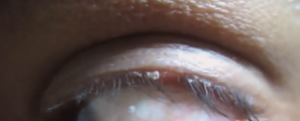The skin that covers eyelids is very sensitive compared to that in other external parts of the body. This makes it less resistant to bacterial infection and harsh environments. The lids are also highly susceptible to allergens; it is likely that they will be the first to be affected when you are about to experience an allergic reaction. Below are some of the causes of flaky eyelids:
Weather Changes
Some people get eyes problems when they stay in either too hot or too warm weather. If your lids get flaky after spending a previous day out in the winter, it is be because of the extremely dry air. For temporary relief, try staying indoors where humidity levels are rather stable. Rooms with air conditioners will work even better for you.
Products unfriendly to the skin
Highly sensitive skins do not auger well with major of beauty products. Certain cosmetics tend to be too harsh to such skins; they will cause you flaky and itchy eyes if you bear a sensitive skin. These may be shampoos, soaps, or even makeup. A few individuals also have bodies that are reactive against Phenylenediamine, a chemical that is found in hair dyes.
At times, the problem may be present in the food that you are consuming. Keep in mind that some types of allergies can develop and disappear instantly; so a food item that you consume today may not cause you any discomfort, but at another time, you may take the same food and suddenly become allergic to it.
If you suspect that you are allergic to a meal, try avoiding it for a few days to see if your eyelids will still be flaky. Sometimes it might just be one ingredient causing the problem; therefore, after you identify the food, start excluding the ingredient one by one until you find the culprit.
Dust particles
Some skins react to dust that contains specific allergens. For instance, house dust that is composed of cockroach body parts and fecal matter is a common trigger of allergies. Many people are also reactive to animal fur and pollen. When determining the cause of flaky eyes, also ask yourself if you have sustained insect bite recently; all these can serve as good pointers.
Rubbing eyes
Excessive rubbing of the eyes can also lead to flaky eyelids. Doing so causes small abrasions to eyelid skin. Flakes occur as a result of reactions in the immune system. This is especially common in children.
Eborrheic Dermatitis
Eborrheic dermatitis comes about when the body is reactive to its own oil. It mostly occurs in people with oily skins. Eyelids are the most affected by this condition because they contain a large number of sebaceous glands- the glands that secret skin oils.
Blepharitis
Blepharitis is an eye condition which arises due to bacterial penetration into oil glands. The condition can be classified either as seborrheic or ulcerative. The latter is more aggressive.
Most patients develop Blepharitis at a young age and experience it throughout their lifetime. In those affected, the flakes develop overnight and form thick crust between the upper and lower lids, making it difficult to open the eye.
Individuals with oily skins and those who get dandruff frequently are the most vulnerable to Blepharitis. While the condition is not completely treatable in genetically predisposed patients, it can be well managed with basic eye hygiene and special eye drops. Blepharitis is not contagious.
Symptoms accompanying flaky eyes
Apart from itching, other symptoms that people with flaky eyes may experience include reddening of eyes, runny nose, soreness, and inflammation. These usually happen after long periods of rubbing. The person may feel tired of opening their eyes.
Treatment for flaky eyes
Asymptomatic treatments can be applied to flaky eyes to relieve discomforts. However, these will rarely produce a lasting effect if the causative factor is not eliminated. It is therefore important that, as you handle the symptoms, consider if there are other avenues through which you can get rid of the underlying problem.
If allergy is the problem, do your best to avoid the triggers. There are also anti-allergy medications that will minimize the body’s response to stimuli. It is advisable that you take such medications only under prescription.
For lifelong conditions like Blepharitis, there are medications that will help affected persons to lead comfortable lives. These work well when combined with proper hygiene, especially for the face.
Moreover, a proper diet will help to minimize imbalances inside the body that might cause excessive immune reaction.Individuals should also strive to protect their eyes from dust, chemicals and mechanical injuries. For example, wear goggles when going to the swimming pool so as to minimize contacts between your eyes and the acidic water.
When crust forms in your eye, don’t pull the lids apart forcefully. Instead, dub them with eye drops or clean water to weaken the bonds.

